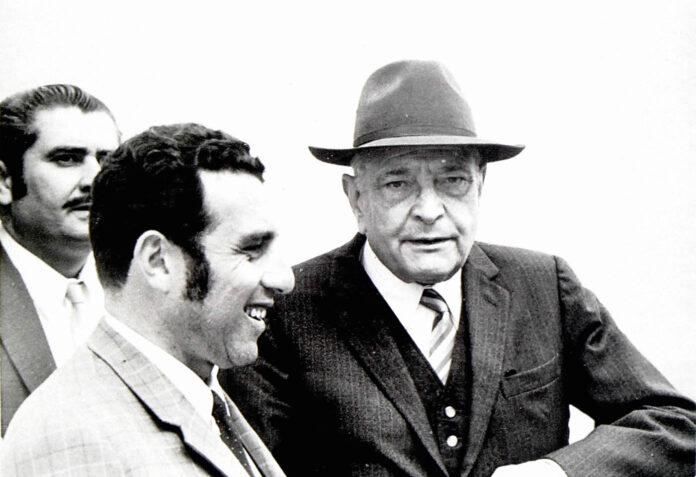I recount in my memories, and the other day I was reminding the photographer and architect Carlos Pallés, that I started working at the newspaper La Tarde in 1970. That was the year the newspaper moved from the Callejón del Combate to the El Águila tobacco factory building.
The building still has an eagle, I don't know if it is made of metal or stone, on one of its narrow balconies. And this was the symbol used by Alfonso García-Ramos, who was to replace Víctor Zurita as director on the latter's death, to head his articles, with the title Pico de Águilas.
Alfonso García-Ramos y Fernández del Castillo was an imaginative, exaggerated man, the author of such interesting novels as Tristeza sobre un caballo blanco, Teneyda and Guad. With the latter he won the Pérez Armas prize. I have the manuscript, dedicated to him.
Linotypists such as Navarro, Manolito, Félix el Palmero, Conrado (who later became a police inspector), Jesús (founder of the Drago printing house, which is still at the forefront of book publishing) and Santiago Tugores corrected our editors. They were certainly enlightened people. Respectfully, they would come down to the editorial office and ask: "What do you mean by that? And they would expose us.
I arrived at the newspaper La Tarde as a meritorious worker, thanks to Mario Zurita, the eldest son of Don Víctor, who was a lawyer and a close friend of my father's. Mario was an intelligent person and had one love above all others: the island of Tenerife. Mario was an intelligent person and had one love above all others: the island of Tenerife. One of Mario's brothers, Jorge, was at that time the soul of the newspaper, as coordinator between the editorial office and the workshops.
Don Víctor had many children, I don't really remember how many. But only two worked at the newspaper: Óscar, who was a very confident journalist and a very good person, qualities he hid behind a notoriously bad temper, who was deputy director with Alfonso and director after his death; and Jorge, whom I have already mentioned.
I stayed at the evening paper until 1976, when I moved to Pedro Modesto Campos's Diario de Avisos. And it was not for money, but for a project.
I had two important assignments at La Tarde as soon as I joined. One, in 71, when the Teneguía volcano exploded on La Palma. As the newspaper's special correspondent. Two, I don't know if it was in 70 or 71, covering the famous crime of the Germans, when a father and son tortured and murdered two daughters and their mother, after committing the greatest atrocities on them.

The newspaper Pueblo sent Raúl del Pozo, the newspaper's reporter at the time, to Tenerife to cover the event, with photographer Raúl Cancio. Del Pozo wrote masterful reports from the island and investigated on his own. Today he is a master of the chronicle from his podium in El Mundo; one of Spain's great journalists.
At La Tarde I was the boy for everything and also the spoilt child. I was assigned to cover a painting exhibition as well as interviewing celebrities who came to Tenerife. I remember conversations with Concha Velasco; with Mary Santpere, who came with a circus and spoke with a strong Catalan accent; with Massiel, after winning Eurovision; with Manolo Santana; with the Tenerife world boxing champion Miguel Velázquez; and with the incomparable Pepa Flores, Marisol. To name but a few interviews.
I was also commissioned to interview Richard Burton and Elizabeth Taylor, who had come to the island to buy a finca, which they sold after a few years. They stayed first at the Hotel Moreque in Los Cristianos and then at the Mencey. I remember that I was able to get some photographs of the couple at the Hotel Moreque, thanks to the fact that my father-in-law was the doctor in Los Cristianos and had been invited with his family to a cocktail party that the establishment hosted for the Burtons.
I used to go to all these meetings, all dressed up. In fact, we dressed better then than we do now, although each time has its own style. When I collaborated, in 71, in the last edition of the Festival Internacional de la Canción del Atlántico, I was given two tasks. To attend to the participating artists and guests, acting as a kind of public relations, and to be secretary of the jury for the song contest in what was to be its most famous and, as I said, its last. I accepted.
I remember going in my car, an elegant white Rover 2000, to pick up Nino Bravo and his wife, Amparo, at Los Rodeos airport. He was coming as a guest artist, not a contestant.
And I continued working at La Tarde. I was in charge, with Jorge Zurita, of designing the newspaper, which we had changed. We had modernised it, based on the model of the newspaper Pueblo, where I did an internship in the design section run by a master, José Asensi.
The Pueblo building, later the headquarters of a ministry, had lifts without doors that never stopped and a deputy director from the Canary Islands, Florentino López-Negrín, from Telde. He facilitated my internship at the newspaper. The best journalists of the time signed for that newspaper, run by Emilio Romero, which had a certain amount of news credentials under the Franco regime.
I was very interested in design. Later I followed a course at the University of Navarra, directed by the Cuban-American Mario García, one of the greats of journalistic design in the world. There I met a well-remembered professor, Alfonso Nieto, who would later become rector and with whom I had intense conversations about journalism, religion and teaching. He was a wonderful person, a member of Opus Dei.

We transferred these design lessons to the newspaper La Tarde, which changed its appearance in just a few years, after it moved from the old Callejón del Combate to Calle de Suárez Guerra in 1970. It incorporated a colour. I remember, among its employees who have not been named, the clerks Inocencio and Segovia; Manolo Silva, who was the bellboy; Paco Rojas, who we managed to get promoted to head of workshops when Guillermo Salazar retired; Tinerfe, Soto, José, Ernesto, and so on. Among the editors, Eliseo Izquierdo, Manuel Perdomo, Olga Darias, Pérez and Borges; José Alberto Santana and the photojournalist Antonio Pallés, the last two of whom were true gentlemen. José Alberto had a section, I think when he worked at El Día, called Instantáneas, which was widely read. In La Tarde, another similar one, Altoberadas. It was about jokes and curious things that he hunted out there. A kind of greguerías. He was a great professional and a kind and polite man. I have very good memories of José Alberto. He always treated me with great respect and I treated him with great respect, as did Antonio Pallés, a lover of cinema and a great friend of a Portuguese Hollywood actor, Tom Hernández.
When I entered the barracks, I think in 1971, the military forced me to sign with a pseudonym. I made up the name Leo, which is my sign of the zodiac. I have already said that I created a successful sports information website, called Leolandia, which everyone read because it told things that nobody dared to publish.
I stayed in Hoya Fría for eighteen months, but I didn't get out of the way because I took refuge in the taifa kingdom of the magazine Atlántida, which was run by the then captain Carlos Ramos Aspiroz, who died in 2022, when he was a retired colonel. He was an agent of Cesid, the secret services of the time.
Many times I would drive home in the captain's car, with his cap on, so that the little lieutenants on guard duty, the ensigns and the sergeants at the gate would square up to me and open the fence for me from a distance, without taking much notice. At other times I would escape from the barracks through a drainpipe that ran all the way to the southern highway.
I was instructed by a young lieutenant, now a general in the reserves, José Pérez-Beviá, who would later marry a friend of mine from university, now a retired magistrate. When I was discharged and went to Almeyda to hand in the few guripa clothes I had left, the sergeant said to me: "But, damn it, do you exist? We had given you up as a fugitive". It turned out that I had been assigned to Almeyda but I never showed up because Carlos Ramos told me to stay with him. And he forgot to tell me.
On one occasion, while I was on duty in the powder magazine - the only duty I did in the whole of my military service - the day commander, who on that occasion was Lieutenant Colonel Melero, turned up for inspection. I was wearing a pair of trousers, a fatigue shirt, a borrowed cap with the insignia of a lance corporal; a mess. The lieutenant colonel, who saw the chaos in my clothes, said to me. "When your watch is over, report to the officers' bar. I replied: "At your orders, Lieutenant Colonel. You fought the war with my father. Melero stood up, looked at me with a sour face and said: "And who is your father? "Perico Chaves," I told him, "Give him my regards and a hug from me. Oh, and you don't have to go to the officers' mess, but get yourself some proper fatigues for the next watch".

Something similar to what happened to me with Lieutenant Colonel Melero had happened to me in the fourth-year exams. I was weak in English and I did a mediocre exam. That test wasn't exactly going to raise my mark. The fourth and sixth year exams were tough. When I handed in the exam I noticed that the teacher was López de Vergara, a nice man, who I knew was a friend of an uncle of mine. He was the son of an unforgettable secretary general of the Cabildo of Tenerife and a well-known lawyer, Don José Víctor López de Vergara. As I handed him the exam paper, I said to him: "From my uncle Miguel, my regards to you and your father". He asked me how I had done, and I replied that I was average. He must have liked me because I passed my fourth-year exams with good marks and I got a higher mark in English.
Happy days at La Tarde, also when I finished my journalism degree. When I announced that I was leaving for Diario de Avisos in May 1976, Alfonso García-Ramos was very angry with me. Here, at this newspaper, I stayed until 82. I also suffered a lot with Alfonso's illness. His funeral was very crowded. He was a witness at my wedding and a great friend.
Today I have the feeling that, by leaving La Tarde, I betrayed him. I was also very saddened by the death of Don Víctor Zurita. I was still in military service when the veteran and brilliant journalist disappeared. He had been an illustrious and free professional. He wrote a book that was fundamental for my degree dissertation and my doctoral thesis: En Tenerife planeó Franco el Movimiento nacionalista. It was banned by the censors.










